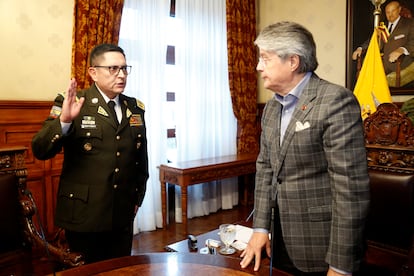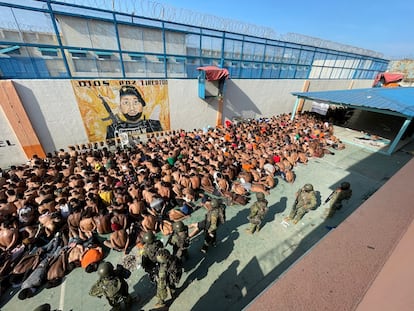Purge begins of Ecuador’s police leadership after seven men implicated in the assassination of Fernando Villavicencio were murdered in prison
President Guillermo Lasso dismissed the commander general of the National Police and the director of prisons


The death of presidential candidate Fernando Villavicencio — who was assassinated on August 9, just days before the elections — has revealed all the ghosts that haunt Ecuador. The investigation into his murder has exposed the gross incompetence of the authorities and the extent to which organized crime has infiltrated public institutions. Seven of the 13 men who were detained for the assassination were murdered this past Friday night and early Saturday morning. They were killed in prison, due to the permissiveness of the guards.
Ecuadorian President Guillermo Lasso was in New York when he learned of the deaths. He subsequently canceled a planned trip to South Korea and flew back to Ecuador, where he convened his security officials. By the end of the session, the president announced a restructuring of the police leadership, which has so far included the dismissal of General Fausto Salinas, the general commander of the National Police. The purge has begun at the highest echelons.
A week before Ecuadorians vote for their next president, Lasso wants to show firmness. He has also ordered the dismissal of the director of prisons (SNAI), Luis Ordóñez, who is being replaced by Fausto Cobo, the current director of Ecuador’s intelligence service.
In the Guayaquil penitentiary (one of the most dangerous in Ecuador) the six Colombian hitmen — who were arrested after the assassination of Villavicencio — were murdered. According to police sources, they were hanged. The seventh murder — that of an Ecuadorian named José Montaño, who was accused of transporting the hitmen and providing them with weapons — occurred at 4 a.m. this past Saturday, at the Inca prison, in Quito… about 260 miles from the Guayaquil prison.
The deaths have shocked the world. Earlier, the U.S. government had offered a reward of $5 million for information leading to the masterminds of the murder of Villavicencio, an investigative journalist who denounced the criminal networks that had infiltrated his country’s politics. From the moment the suspects were arrested, those most skeptical of the state’s ability to solve the crime feared for their lives. The six Colombians were set to be transferred to another prison — but the order was never carried out. The government has filed a criminal complaint against the director of the Guayaquil prison, who is now detained for his alleged collaboration.

Riots have previously occurred in the Guayaquil penitentiary, resulting in dozens of deaths. Criminal gangs — associated with drug cartels — fight for control over the jail. It certainly didn’t seem like the best place to shelter the accused, especially when there were strong suspicions that they could be the victims of settling scores, or attempts to silence them forever. Weeks before they were killed, a drone with explosives flew over the prison. The device detonated and damaged the roof of the building. The circle was tightening around the hitmen.
Ecuadorians are shocked by the violent drift of their society. For decades, they were safe from the violence that plagued the two neighboring countries, Colombia and Peru, the two largest coca producers in the world. However, in recent times, Mexican and Colombian mafias have infiltrated Ecuador. Through associations with local gangs, they’ve managed to challenge the state. And the power of these groups of gang members has grown, paradoxically, from the prisons.
So far this year, 5,320 murders have been recorded in Ecuador, while in 2022, the country recorded its highest number in history (4,600) — double that of 2021. The figures place Ecuador among the most dangerous countries in the world.
All of this is occurring just one week before the runoff of the presidential elections on October 15. Ecuadorians will choose between a young businessman — Daniel Noboa — and Luisa González, a former minister and close ally of former president Rafael Correa (2007-2017).
After Villavicencio’s murder, the candidates have limited their public events, campaigning mainly via social media. The main issue up for debate, unsurprisingly, has been insecurity. Noboa has promised floating prisons offshore to lock up the most dangerous prisoners, while González has pledged to return the country to the times of Correa, when insecurity wasn’t as prevalent as it is today.
Sign up for our weekly newsletter to get more English-language news coverage from EL PAÍS USA Edition
Tu suscripción se está usando en otro dispositivo
¿Quieres añadir otro usuario a tu suscripción?
Si continúas leyendo en este dispositivo, no se podrá leer en el otro.
FlechaTu suscripción se está usando en otro dispositivo y solo puedes acceder a EL PAÍS desde un dispositivo a la vez.
Si quieres compartir tu cuenta, cambia tu suscripción a la modalidad Premium, así podrás añadir otro usuario. Cada uno accederá con su propia cuenta de email, lo que os permitirá personalizar vuestra experiencia en EL PAÍS.
¿Tienes una suscripción de empresa? Accede aquí para contratar más cuentas.
En el caso de no saber quién está usando tu cuenta, te recomendamos cambiar tu contraseña aquí.
Si decides continuar compartiendo tu cuenta, este mensaje se mostrará en tu dispositivo y en el de la otra persona que está usando tu cuenta de forma indefinida, afectando a tu experiencia de lectura. Puedes consultar aquí los términos y condiciones de la suscripción digital.








































